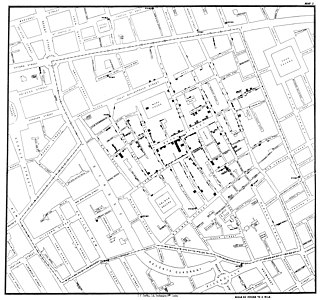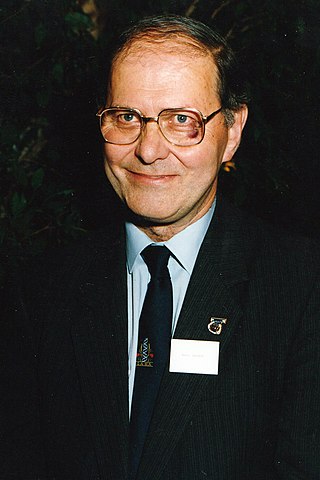Related Research Articles

Human geography or anthropogeography is the branch of geography that studies spatial relationships between human communities, cultures, economies, and their interactions with the environment, examples of which is studied in schools are urban sprawl, urban redevelopment etc. It analyzes spatial interdependencies between social interactions and the environment through qualitative and quantitative research methods.
Regional science is a field of the social sciences concerned with analytical approaches to problems that are specifically urban, rural, or regional. Topics in regional science include, but are not limited to location theory or spatial economics, location modeling, transportation, migration analysis, land use and urban development, interindustry analysis, environmental and ecological analysis, resource management, urban and regional policy analysis, geographical information systems, and spatial data analysis. In the broadest sense, any social science analysis that has a spatial dimension is embraced by regional scientists.
(Ivan) Jean Gottmann was a French geographer who was best known for his seminal study on the urban region of the Northeast megalopolis. His main contributions to human geography were in the sub-fields of urban, political, economic, historical and regional geography. His regional specializations ranged from France and the Mediterranean to the United States, Israel, and Japan.

David W. Harvey is a British-born Marxist economic geographer, podcaster and Distinguished Professor of anthropology and geography at the Graduate Center of the City University of New York (CUNY), though he often claims to prefer the term Marxian. He received his PhD in geography from the University of Cambridge in 1961. Harvey has authored many books and essays that have been prominent in the development of modern geography as a discipline. He is a proponent of the idea of the right to the city.

Sir Nigel John Thrift is a British academic and geographer. In 2018 he was appointed as Chair of the Committee on Radioactive Waste Management, a committee that gives independent scientific and technical advice on radioactive waste to the UK government and the devolved administrations. He is a Visiting Professor at the University of Oxford and Tsinghua University and an Emeritus Professor at the University of Bristol. In 2016 and 2017 he was the executive director of the Schwarzman Scholars, an international leadership program at Tsinghua University in Beijing. He was the Vice-Chancellor of the University of Warwick from 2006 to 2016. He is a leading academic in the fields of human geography and the social sciences.
Political geography is concerned with the study of both the spatially uneven outcomes of political processes and the ways in which political processes are themselves affected by spatial structures. Conventionally, for the purposes of analysis, political geography adopts a three-scale structure with the study of the state at the centre, the study of international relations above it, and the study of localities below it. The primary concerns of the subdiscipline can be summarized as the inter-relationships between people, state, and territory.
David Sadler is a professor and a researcher of human geography.
Ghazi-Walid Falah is a Bedouin Israeli-Canadian geographer, who is a tenured professor at the University of Akron, Ohio. He is an expert on political, social and urban geography of the Middle East and the Arab World, with special emphasis on Israel. He has published over 45 articles in 23 peer reviewed journals, and he has given papers at numerous conferences. He is author and co-editor of five books and monographs, including Geographies of Muslim Women, co-edited with Caroline Nagel. He also has co-authored articles with two colleagues, David Newman and Colin Flint, with whom he has conducted joint research.

The quantitative revolution (QR) was a paradigm shift that sought to develop a more rigorous and systematic methodology for the discipline of geography. It came as a response to the inadequacy of regional geography to explain general spatial dynamics. The main claim for the quantitative revolution is that it led to a shift from a descriptive (idiographic) geography to an empirical law-making (nomothetic) geography. The quantitative revolution occurred during the 1950s and 1960s and marked a rapid change in the method behind geographical research, from regional geography into a spatial science.
Erik Achille Marie Swyngedouw is professor of geography at the University of Manchester in the School of Environment, Education and Development and a member of the Manchester Urban Institute.
Michael A. Crang is the Head of Department in the Department of Geography at Durham University. He is a Professor in cultural geography, with his main research areas relating to the relationship between social memory and identity, theories on space and human perception of space as well as critical theories.
Neil Robert Smith was a Scottish geographer and academic. He was Distinguished Professor of Anthropology and Geography at the Graduate Center of the City University of New York, and winner of numerous awards, including the Globe Book Award of the Association of American Geographers.

Brian Joe Lobley Berry is a British-American human geographer and city and regional planner. He is Lloyd Viel Berkner Regental Professor in the School of Economic, Political and Policy Sciences at the University of Texas at Dallas. His urban and regional research in the 1960s sparked geography’s social-scientific revolution and made him the most-cited geographer for more than 25 years.

Peter Haggett is a British geographer and academic, Professor Emeritus and Senior Research Fellow in Urban and Regional Geography at the School of Geographical Sciences, University of Bristol.

Paul C. Adams is an American geographer who is Professor and Director of Urban Studies at the Department of Geography and the Environment at University of Texas at Austin. Adams applies various approaches from human geography to study media and communication. His research has helped develop the subdiscipline geography of media and communication by integrating studies of place representations, communication infrastructures, social processes, and routines of media use in daily life.
John Robert Victor Prescott FASSA was a British and Australian academic, author, and professor emeritus at the University of Melbourne. A political geographer, most of Prescott's work focused on international boundary issues, particularly maritime boundaries.

Anne Buttimer was an Irish geographer. She was emeritus professor of geography at University College, Dublin.
Ray Hudson, FBA, FAcSS is a British academic. He holds the degrees of PhD and DSc from Bristol University and. DLitt from Durham University. He was Professor of Geography and Deputy Vice-Chancellor at Durham University. From 2014–2015 he was acting Vice-Chancellor and Warden of Durham University. Currently he remains as Emeritus Professor of Geography.
Alasdair Drysdale is professor emeritus of geography and formerly associate dean of the College of Liberal Arts at the University of New Hampshire.
Janice Jones Monk is an Australian-American feminist geographer and researcher in the South West United States, and an Emeritus Professor at the University of Arizona School of Geography, Development and Environment.